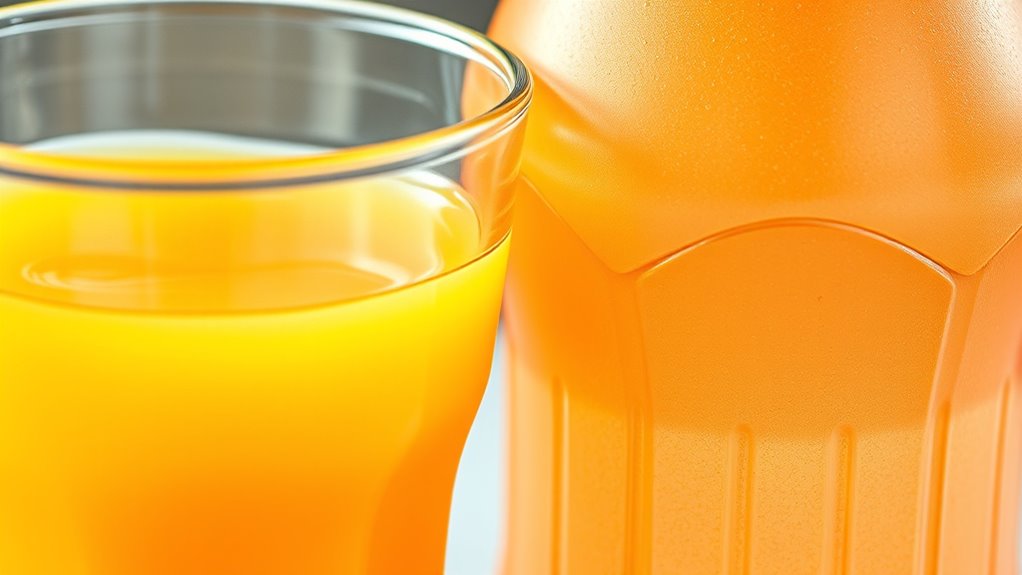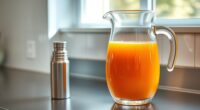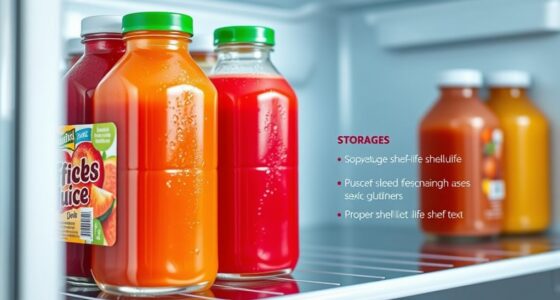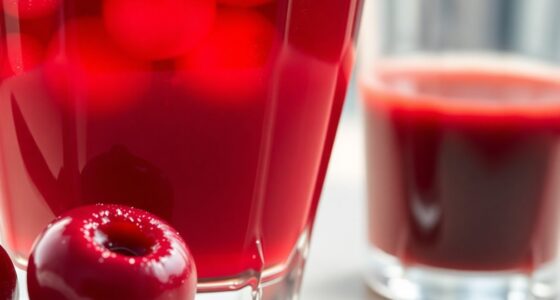If you want your juice to stay fresh longer, glass containers are the better choice. They are non-porous, preventing bacteria and odors from getting in, and their sealing potential helps keep out oxygen and contaminants. Plastic may be more convenient but can develop scratches and cracks that trap bacteria and allow spoilage agents to reach your juice faster. To discover more about how material choices impact freshness and safety, keep exploring the options available.
Key Takeaways
- Glass is non-porous, preventing bacteria and odors from contaminating stored juice, thus maintaining freshness longer.
- Its impermeable nature reduces oxygen and contaminant ingress, slowing spoilage compared to plastic.
- Glass withstands cleaning and reuse without degradation, sustaining sealing quality and freshness over time.
- Plastic’s scratches, cracks, and permeability can harbor bacteria and allow spoilage agents, reducing juice freshness.
- Glass is more environmentally sustainable, encouraging reuse and recycling, which supports long-term freshness preservation.
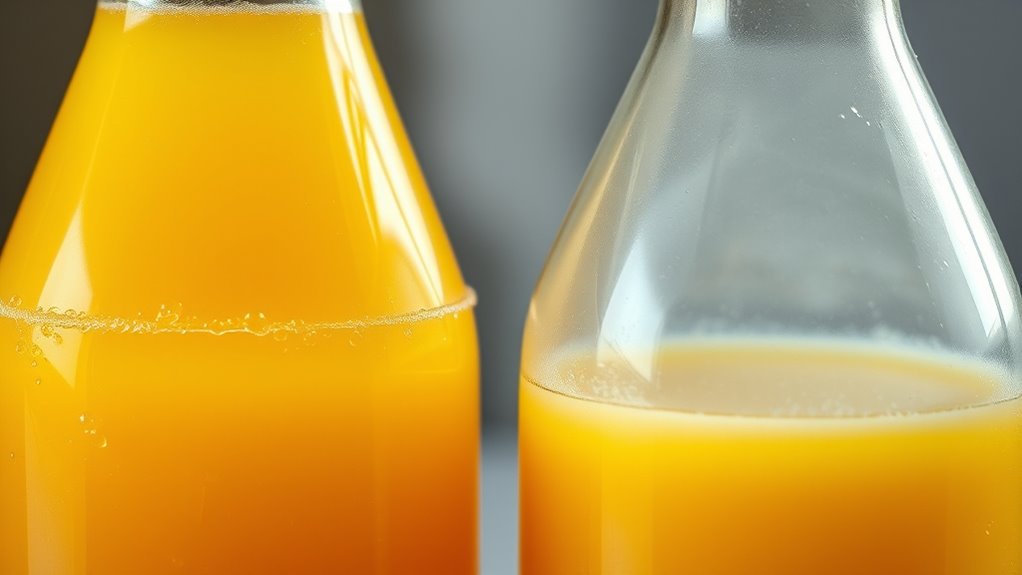
When choosing packaging for your juice, the decision between glass and plastic often comes down to safety, environmental impact, and convenience. Both options have their advantages and drawbacks, but understanding how they affect freshness and safety can help you make the best choice. One key aspect to consider is bacterial growth. Plastic containers, especially if not properly cleaned or if they develop scratches and cracks, can harbor bacteria more easily. These imperfections provide hiding spots for bacteria, making it harder to keep your juice fresh and safe over time. Additionally, plastics are more permeable than glass, which can allow oxygen and other contaminants to seep in, accelerating spoilage. This means that juice stored in plastic might not stay fresh as long as in glass, especially if the packaging isn’t sealed tightly or if the plastic degrades over time.
Furthermore, the integration of automation technologies in packaging processes is improving the quality control and sealing effectiveness, helping to preserve freshness more reliably.
On the other hand, glass offers a non-porous surface that resists bacterial adherence and growth. When you store juice in a clean, sealed glass container, you substantially reduce the risk of bacterial contamination, helping preserve the juice’s freshness longer. Glass also doesn’t absorb odors or flavors, so your juice remains pure and untainted. This is especially important if you’re storing different types of juice or want to prevent cross-contamination that can occur in plastic containers over multiple uses.
Environmental impact is another major factor influencing your choice. Glass is highly recyclable and can be reused many times without degrading in quality. It’s a more sustainable option, reducing waste and environmental pollution over the long term. Plastic, while initially lighter and more convenient, poses concerns because it’s often made from petrochemicals, which are non-renewable resources. Many plastics are not easily recyclable, and even when they are, the process can be energy-intensive and result in downcycling—where the plastic is turned into lower-quality products. Furthermore, plastic waste contributes substantially to environmental pollution, harming wildlife and ecosystems. Choosing glass can help minimize your ecological footprint, especially if you reuse containers instead of discarding them.
Frequently Asked Questions
Do Glass and Plastic Containers Impact Juice Flavor Differently?
You’ll notice that container material influences juice flavor preservation. Glass containers don’t react with the juice, so they keep the flavor pure and fresh longer. Plastic containers, on the other hand, can sometimes impart a subtle taste or odor, affecting the overall flavor. So, if you want to preserve the authentic taste of your juice, choosing a glass container is usually the better option for flavor preservation.
Are There Safety Concerns With Plastic Leaching Into Juice?
Like Pandora’s box, plastic containers can pose safety concerns due to chemical leaching, especially when exposed to heat or sunlight. You might unknowingly ingest health risks from chemicals like BPA, which have been linked to hormonal disruptions. To protect yourself, opt for BPA-free plastics or glass, reducing the chance of harmful chemical leaching into your juice and safeguarding your health with every sip.
Which Material Is More Eco-Friendly for Juice Storage?
You should choose glass for eco-friendliness because it offers better recycling benefits and has a lower environmental impact. Glass is reusable, recyclable without quality loss, and often recycled more efficiently than plastic. While plastic may be lightweight and convenient, it contributes more to pollution and waste. By opting for glass, you support sustainable practices and reduce your ecological footprint, helping protect the environment for future generations.
How Do Storage Temperatures Affect Glass and Plastic Containers?
Imagine pouring fresh juice into a glass container and leaving it in a hot car; the temperature effects cause the juice to spoil quickly. Both glass and plastic containers benefit from proper storage temperatures, as insulation helps maintain freshness. Plastic may deform under high heat, while glass resists temperature changes better. To preserve quality, keep containers in a cool, consistent environment, preventing temperature fluctuations that accelerate spoilage.
Are There Specific Juices That Preserve Better in Glass or Plastic?
You’ll find that fruit juices, like apple or orange, often stay fresher in glass because it blocks more light and prevents oxidation. Vegetable juices, such as carrot or beet, may preserve better in plastic if stored properly because they’re less prone to breakage and contamination. Ultimately, choose glass for longer-term storage of delicate juices, and opt for plastic when convenience and durability matter most.
Conclusion
Think of your juice as a delicate song that needs the perfect environment to stay vibrant. Glass acts like a trusted concert hall, preserving every note’s freshness and clarity. Plastic, on the other hand, is like a busy street—convenient but more prone to noise and disturbance. For the purest, most lasting flavor, choose glass. It’s your quiet, elegant sanctuary that keeps your juice singing sweetly, sip after sip.
Cindy thoroughly researches juicing trends, techniques, and recipes to provide readers with practical advice and inspiration. Her writing style is accessible, engaging, and designed to make complex concepts easy to understand. Cindy’s dedication to promoting the advantages of juicing shines through her work, empowering readers to make positive changes in their lives through the simple act of juicing.

